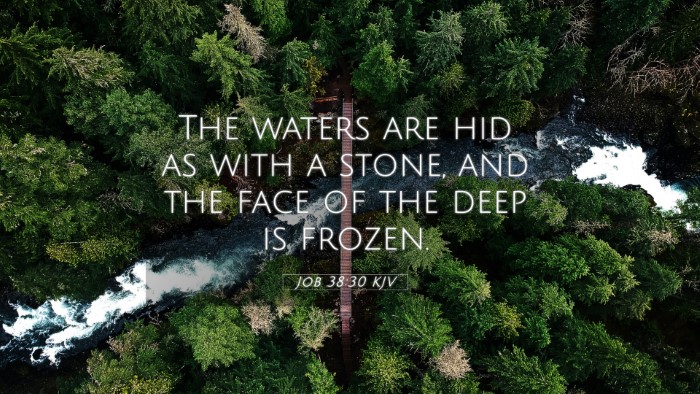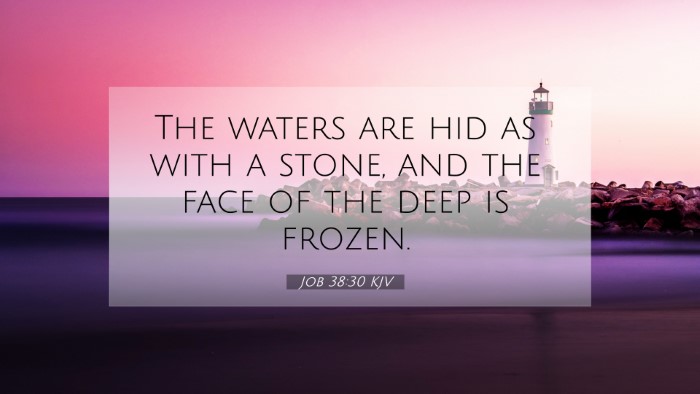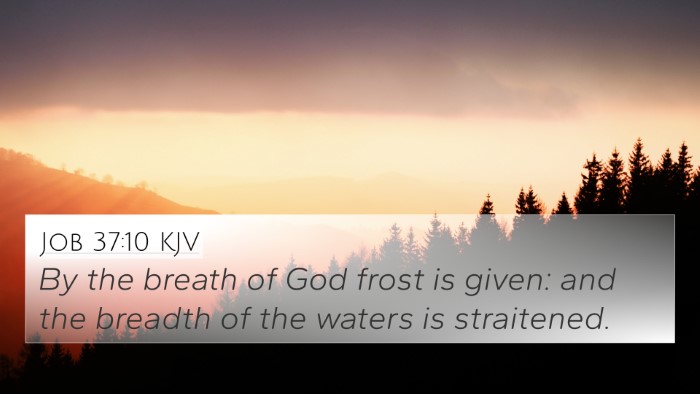Understanding Job 38:30
Verse: "The waters are hid as with a stone, and the face of the deep is frozen."
The verse from Job 38:30 arises from a larger dialogue where God is addressing Job, teaching him about the vastness and intricacies of creation. This chapter demonstrates God's power and wisdom in the natural world, contrasting human limitations with divine omnipotence.
Summary of Insights from Commentaries
Matthew Henry's Commentary:
Henry emphasizes God’s sovereignty over nature and the elements. This verse illustrates how God can conceal the waters as if they are stone, representing both His authority and the mystery of nature that humans cannot fully comprehend.
Albert Barnes' Notes:
Barnes discusses the imagery of the waters being hidden and the profound nature of the deep, suggesting that this indicates the unsearchable depths of God's creation. He connects this to human ignorance in understanding the natural laws established by God.
Adam Clarke's Commentary:
Clarke refers to the metaphor of frozen waters, relating it to God’s control over creation and how He governs the natural world. Clarke points out that the phrase highlights both the beauty and the terror of nature, reflecting God's ultimate authority.
Thematic Connections
This verse connects thematically with various other scriptures that explore God’s power over creation and the limits of human knowledge:
- Psalm 104:6-9 - It describes the boundaries of the waters established by God.
- Isaiah 40:12 - Talks about God measuring the waters in His hand, highlighting His control over them.
- Proverbs 8:29 - Refers to God laying the foundations of the earth and controlling the sea.
- Job 28:14 - Discusses the depths of the sea and the limits of human understanding regarding wisdom.
- Luke 8:24 - Jesus’ calming of the storm, reflecting His power over nature.
- Revelation 21:1 - References a new heaven and earth where the sea is no more, reflecting God's ultimate sovereignty.
- Jeremiah 5:22 - God’s command over the sea and its waves, illustrating His authority.
Cross-Referencing Biblical Texts
For those interested in deeper study, this verse provides numerous opportunities for cross-referencing:
Using tools for Bible cross-referencing can greatly enhance your understanding. Here are some methods:
- Bible Concordance: Utilize a concordance to find related verses that speak to God's control over nature.
- Bible Cross-Reference Guide: This can pinpoint other scriptures that discuss similar themes, such as God’s sovereignty and human ignorance.
- Bible Chain References: Follow thematic links to dive deeper into the connections between scriptures.
Comparative Bible Verse Analysis
Engaging in a comparative study of the relationships between this verse and others allows for a rich exploration of Biblical themes. For example, contrasting Job's suffering and God's mighty power portrayed throughout the Book of Job with the New Testament’s portrayal of God’s redemptive nature enhances our understanding of divine attributes.
Practical Applications
Inter-Biblical Dialogue: Understanding Job 38:30 in the light of other scriptures encourages believers to reflect on the vastness of creation and God’s supreme authority. This can instill a sense of awe and reverence towards God’s power and mystery.
Personal Reflection: As individuals study this verse, they may contemplate their human limitations compared to God’s unlimited wisdom and control over the universe.
Conclusion
In summary, Job 38:30 serves as a profound reminder of God’s control over nature and the depths of His wisdom, inviting readers to explore further connections among Biblical texts. It encourages believers to appreciate the intricate details of creation and to recognize the limitations of human understanding in the face of divine omnipotence.



